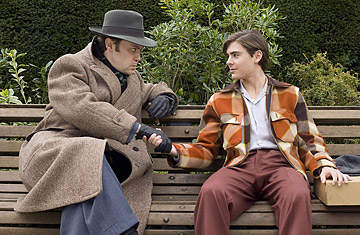
Christian McKay as Orson Welles and Zac Efron as Richard Samuels in Me and Orson Welles
Imagine you adore a blue-eyed young man with a pert nose and a soft wave of brown hair, and so you get your parents to take you to his latest movie, Me and Some Dead Guy Who Was Famous Once and the boy is even cuter than usual, but there's also this big guy, with crazy eyes and much less docile hair, who talks about Shakespeare (kill me now), insults everybody — the cute boy worst of all — and chews cigars and sometimes when he talks you see actual spit coming out of his mouth? And on the way home your parents start talking about Oscar nominations, which they never did after High School Musical 3 and it turns out that they aren't talking about Zac at all, but Crazy Eyes? Wouldn't that be a major bummer?
Unless, that is, you're more curious about Orson Welles than about the charming but still callow Zac Efron. In the new Richard Linklater film, Me and Orson Welles, a youthful Welles is brilliantly embodied by Christian McKay in one of those, hey-who's-that? performances that tends to draw Oscar talk, even if the film itself isn't much more than an extremely pleasant lark. It is set in 1937, when Welles was just 22 and his ego was better established than his career. His broadcast of H.G. Wells' The War of the Worlds was a year away, Citizen Kane four years. But already Welles was keeping multiple mistresses and holding an entire cast hostage to his whims. "The principal occupation of the Mercury Theater is waiting for Orson," explains the young John Houseman (Eddie Marsan).
Based on Robert Kaplow's young adult novel of the same name, the story blends fictional characters with real ones. Efron plays a fictional one: 17-year-old Richard Samuels, a high school student who worships Noel Coward and who acts as our main conduit into Welles' world. Welles plucks Richard off the street and gives him a small but crucial part in his version of Julius Caesar, which truly was performed, to great success — in modern dress with a fascist theme — at New York's Mercury Theater that fall.
Spending a week in Welles's orbit, Richard learns how to light a match in the coolest possible way, how to impress a girl and, like Icarus, he discovers what happens when you get too close to a star. He rubs elbows with plenty of real people who were fast becoming Welles' loyalists, like Houseman, Joseph Cotton (James Tupper), George Coulouris (Ben Chaplin) and radio star Les Tremayne (Michael Brandon) as well as one fictional dream girl, Sonja (Claire Danes), a Vassar grad who functions as the production's girl Friday and occasionally, as Welles requires it, geisha to the resident genius.
McKay's performance, which marries physical resemblance to internal channeling — he's practiced in this, having written and performed a one-man show called Rosebud: The Lives of Orson Welles — is exceptional. But there's one insurmountable problem: his age. He's 36, and passing for Welles at 22 is more than a stretch, especially when you're up against the world's biggest teenybopper. When Orson and Richard are briefly positioned as romantic rivals for Sonja, it's ludicrous, no matter how much charisma Efron exudes — since our perception of him is as a man in his mid-30s, based on McKay's appearance, it hardly seems like a legitimate context. Sonja is not as worldly as she'd like us to believe — she's all red lipstick and knowing looks — but she and Richard still seem light-years apart in terms of maturity. It doesn't help the plot's credibility that there's something slightly off about Danes — her vivacity is a kettle threatening to boil over — and that we, along with Richard, have already met his far better match, a quirky aspiring writer (the adorable Zoe Kazan) who is his equal in unjaded excitement.
Linklater (Dazed and Confused, School of Rock) usually sticks to contemporary stories, or ones set in the recent past. (An exception, The Newton Boys, a 1920s-set western, was his least memorable film.) Nothing about Me and Orson Welles suggests a directorial affinity for period pieces. When a vintage ambulance pulls up to transport Welles around Manhattan, you half expect the prop master to pop out and buff the hood with pride. But Linklater's great strength lies in showing how "families" form in unexpected places, especially when it's a question of putting on a show. Here we're witnessing not only genius at work (watching rehearsals, we might doubt this Julius Caesar, but what we see of the opening night is electrifying; that's when you really thrill to McKay's Welles) but also the way Richard falls in love with the idea of theatrical family.
In one scene, Richard is exploring backstage, and we feel his pleasure in his insider status; he's puffed up from it. Then he lights a match to better examine graffiti left by someone who walked these boards in earlier days and inadvertently sets off the theater's sprinkler system, dousing everything, including Welles, who is madder than a wet cat. It perfectly catches the mood of the theater as seductress: one minute, she wants you, she makes you feel blessed, another, she reminds you what a buffoon you are to believe you belong here.
